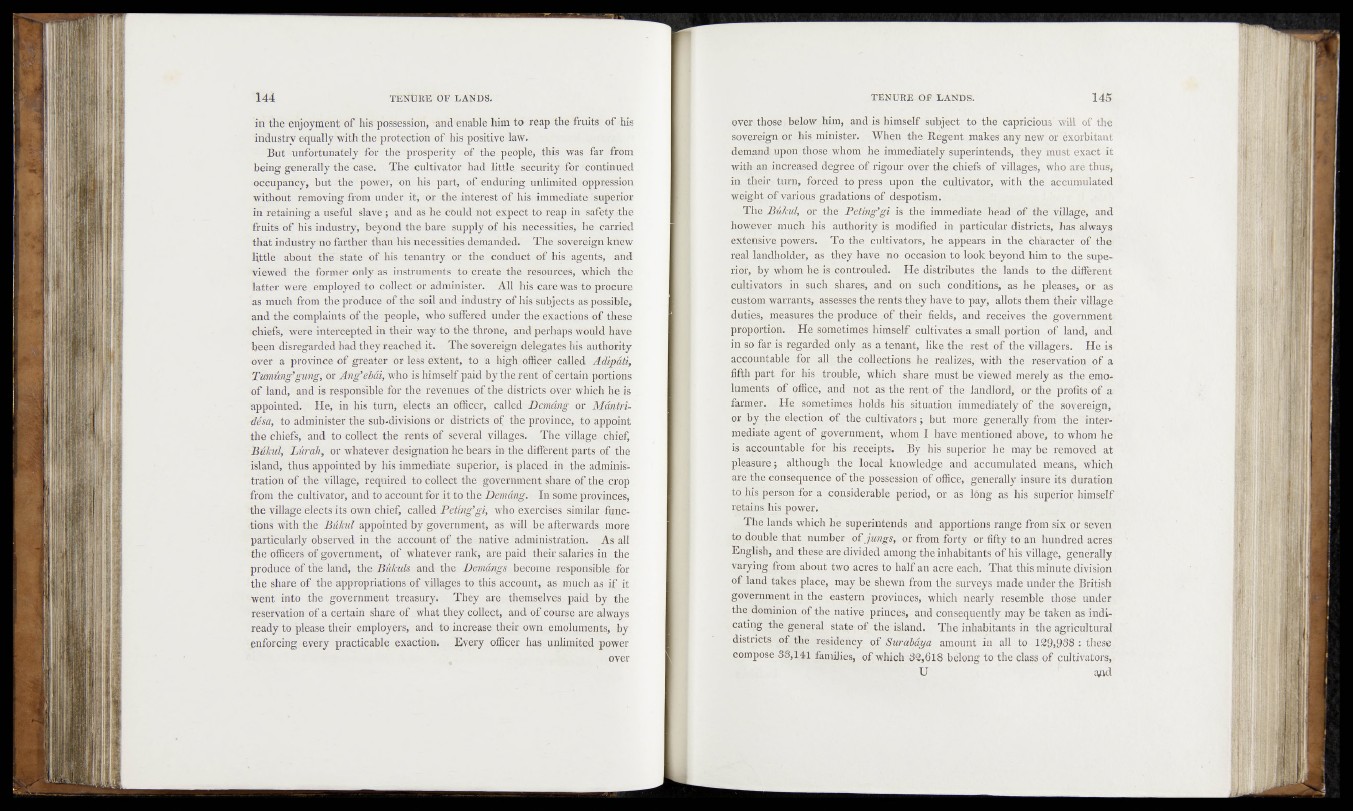
in the enjoyment of his^possessioii, -and-enable him to reap the fruits of his
industry equally witîufhê protection of his positive law.
But - unfortunately för -th'ê'-'prosperity vof -the people, .this was far from
being generally thé casé. The . cultivator, had little, s'ecurrÇyUfor continued
occupancy, but the power, 'oil his part, of.'.enduring unlimited- oppression
without removing from under it, cir ithe interest ofhis. immediate'superior
in retaining a useful slave ; and as he cöuld not expect to reap in safety ithe
ftuits of his industry,-beyctad the bare supply of his necessities*.- he,' carried
that, industry no farther than his necessities demanded. The sovereign kn,ew
little about the -state of his-tenantry or the .conduct of hig.-agents,and
'Viewed the former dnly-as instruments to. create the resources, which Abe
litter were, employed to collect or administer. All -his,!eai;e.was to procure
as much from the produce of the soihand-industry, of his suibjgcts asjpossible,
fand the complaints of the. people, who suffered under the exactions of these
(chiefs, Were interceptediin thëir way-to the throne, and perhaps would hâve
heen disregarded -had they reached it. The sovereign-delegates-his. authority
■over a province of greater -orless bx'tent, to a higHiofficer Galled Admâti,
Tumûng’gung, or Ang’ebâi, who is-himself paid -by the rent of certain jportions
■of land,-' and is responsible for the revenues óf -the?.disfïi6t s over \|fe|i.J?.e is
appointed. He, in his turn, 'elects an ‘officer* called- -Demang or, Mdmtri-
-désa, to administer th e sub-divisiöns or districts of the province,-Ao appoint
the chiefs, and to collect the .-rents of several villages. , .The, yillage^chief,
Bukui, Iiurah, or whatever designation he bears in-£he different?parts^ofwjhè
island,-thus appointed by his immediatè superiores placedfin the.adjnihds-
tration of the -village, : required to collect the government ^baye' ohthei^oh
from the fcultivator, and to account for it-to the Bemâng-.- rn-some-proÿinêes,
the village-elects‘its own chief, -called Peting’gi, who exercises, 'simdaï ,-fu-nci
fions with the JBüMil appointed by government* as will be afterwards, more
particularly observed in the account of the native administration. , As all
the officers Of government^ of whatever rank, are paid their salaries in the
produce Of the land, the.B&kuls- and the >Demângs .beçome responsible-for
the share of -the appropriations .of villages to this account, as much as < if, it
Went into .the government treasury. They are themselyés, paid by the
reservation of axer tain shate: of: what they collect* and of course are always
ready tó please their employers,,:and to increase their own,emoluments, by
enforcing-every practicable exaction. Every officer has unlimited power
oyer
pver those below him, and-is himself, subject? to the capricious will'of the
sovereign, or his^ininister.-.-;.When thei-Regent. makes any new or'exorbitant
demand ,upon;those .whom' he immediately.'superintends, - they must exact it
with an increased degree .ofi rigour'-oyer .theichiefs of villages, who are thus,
in ,their;j- turn, fforced^to,p.tess^upon^the\\ciiltivator, with the accumulated
weight ofyarious;gradations;,of despotism!/ /
The Bukui, or, the ^Pfitfyg’g ifis /the Imme'diateOiead'of the village, and
howeyer much? his authority, is moaifie'cLrin particular districts,-hasralways
extg^siye powers. Toim^mltiyators,' he appears in 'the character of the-
real landholder, -.as^j-they have^no, pccasion-to look beyond him to the supe--
ridr, ■ by whom he is controlled.) He distributes lands to, the different
cultivators iii .sharqs, .and - Qn^sjuoh“' conditions,-' as he pleases, or.- as
customyvarrants,, assesses the rents, they.’havejtq pay, allots them their village.
dut^e^.measqres--‘the prqdj?cdW|^| their fields,land rqif«fel'theIgovernment*
proportion. He.SQmefjm.esi hirasplfloMtiyates --a small pQrtion xf, land, and>
in ,so far, is r^garjled^njfe^ a, tenant,' like^the vest ! villagers.' He is
^countable fo^ all^qg,^coffecj:ions^^e-, realizes,- with, .the reservation, ypf a
fifth- part (h?|)Shp^&oi^ile, which '(share .musf'be, viewed jmer&ly’aJs '.the- erhoV.
lumentsffiof o|5c'e,_a.ndj not, as,the ren^bfi^ie*landlord, or the profits of a
fefmer« . He^ jp n j,^ g ^ ;ghqlds1Jbis.isituati0'n immediately of.the soyCtpigpj.1
cultivators ^Jaut^mpre' generajly^jfom tthe inter-.'
njfidiltfe ^ ^ ^-jp ^ ^eEnffient,' .who^f I have-mentioned' aboyeVftcr wipnr he
isja^^untabl^jfor his receipts. By msgsuperior he may be remoyed at
pleasure; although. the, local• knowledge, and, accumulated -means, .Ayhich
arefffil ^ n sequende' ofethq, possession 0f office, .generally rinstee its dOratSon
fpr a considerable period, or., ks I5ng. as |ii§ j superiorihimsfelf
l'etejbs his power.
•aPd? lands ^hich superintends. and apportions rangq ffomsix'OrfseVeh
^I^Ujble that number ^of jwngs, or from fpTtyf orffuty to an hundred acres
English, and these are divided among the inhabitantsjof his village, generally;
two aGresfto.half an ac,re;each. That.‘th^jirqnute' division ,
of .land takes place, may beshewn from the surveys, made(under, the British1?
goyeynment in the pastern -provinces,Vwhich nearly resemble thlfse undo?,
the-xomrqiOTL_ of the native^ princes, and consequently may b,e "taken as-indi-
cating the general sta^e- of the island. . The inhabitants in the agricultural
districfg^of^the ^e.sjdency of Surabaya amount' in all to 129,938 :^these5
compose 33,141 families, of, which -32,618 belong to'the class oft' cultivators,!
j j j j \ f- ^